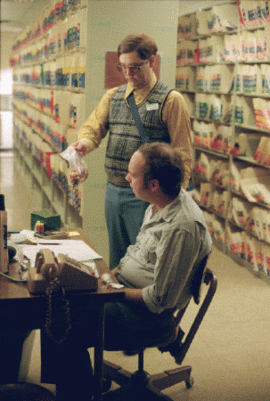A recent post on MinimalMac posits an interesting case for the slow, growing sense of the irrelevance of Microsoft, at least in the applications space. Go and read the piece – it’s excellent – but the gist is that for years Microsoft banked on Office being as important to users as, say, Windows. Office is Microsoft’s biggest money maker and for most of this decade no self-respecting IT department would consider any alternatives, even though they existed. You needed it to get work done. OpenOffice? That stuff was just weird.
However, with the rise of tablets, office workers have suddenly noticed that they don’t need Office anymore. All they need is an email app, a notepad, and something like Dropbox. You can open Office docs on any device, you can edit text on nearly any tablet, and $9.99 gets you a capable word processor on the iPad. In short, Office is becoming irrelevant.
Patrick Rhone calls this a “miss” but I call it a paradigm shift. This shift is probably as jarring to offices as the transition from paper to electronic records and I doubt the reverberations of this shift will die down any time soon.
The story of office automation has been one of slow and inexorable change. As a child of the 1980s, I’m amazed when I watch movies and documentaries that show records being stored in a big room staffed by the office equivalent of librarians. As an adult of the aughts, on the other hand, I find myself appalled at the necessity for paper records and often, in a fit of pique, I fill out forms with my own style of chicken-scratch handwriting. Take customs forms at the border, for example: what government will ever be able to go through those written records in time to notice, say, a nefarious pattern? It’s literally impossible and it’s a waste of paper. Harumpf.
But old habits die hard and although we’re not even close to a paperless office yet, I think the rise of tablets will move us that final step towards a place of no printers. For most of this century, the main means of communication has been a typewritten report or memo. People needed eight hours in an office just to go through paperwork. When they took work home they took paper home. Even the desktop paradigm – the trash can, the inbox, the folder – mirrors this concept.
But what is the paradigm now? Mobile OSes don’t have trash cans or folders. Email apps talk about accounts and the icons show little paper airplanes rather than a flying letter. That the OS X Mail icon is still a stamp is as much an anachronism as saying you’re “dialing” a cellphone (but don’t get me started on Apple’s incessant desire to mirror real-world objects. Leather calendars? Really?). In less than a decade, our mental models for getting work done went from “go to some guy in records to find a number” to “Google it.”
And what was Word if not the ultimate typewriter? Word was the gold standard for the printed word, a way for the design-challenged to create a handsome training manual or break room notice (“Do not drink the ‘milk in the fridge’ it is Tonys.”). What was Excel if not a handsome, electronic ledger? You could print out reports with the important numbers in bold or, if your office was really rich, you could print it on the color laser printer.
And what was Access (remember Access?) but a way to put those poor schlubs in records out of a job?
Now Office’s namesake, the office, is changing. I’m not saying it’s changing quickly nor is it changing as wildly as I would like, but with the move to web-based business interfaces, cloud computing, and instant sharing, there is less impetus to make documents look “professional” and more on just getting them out the door. I think the real switch will come when documents, as a matter of course, will be signed electronically and not by hand. This will spell the death knell for Office and usher in a new era of entirely cloud-based document handling.
Is Microsoft sunk because of this? Absolutely not, but they’d better start spinning up some services that speak to the post-Office generation. After all, who needs Word templates when you can make this in two seconds.
